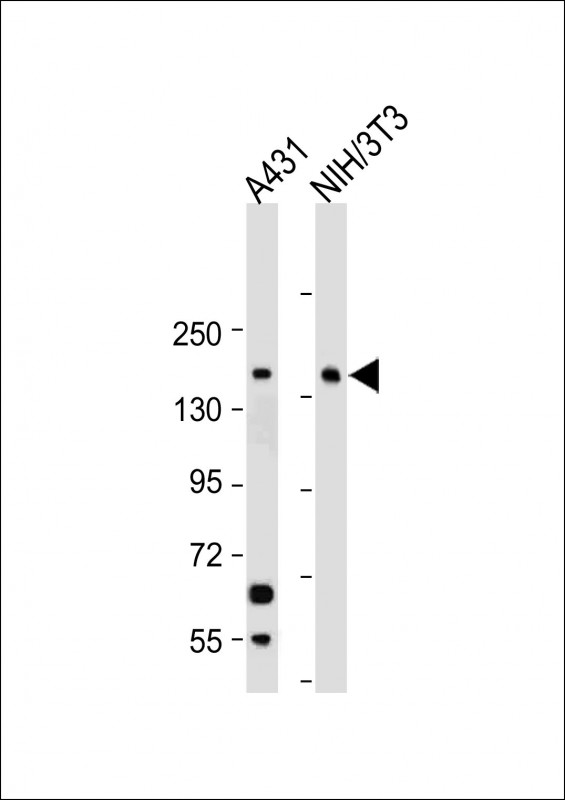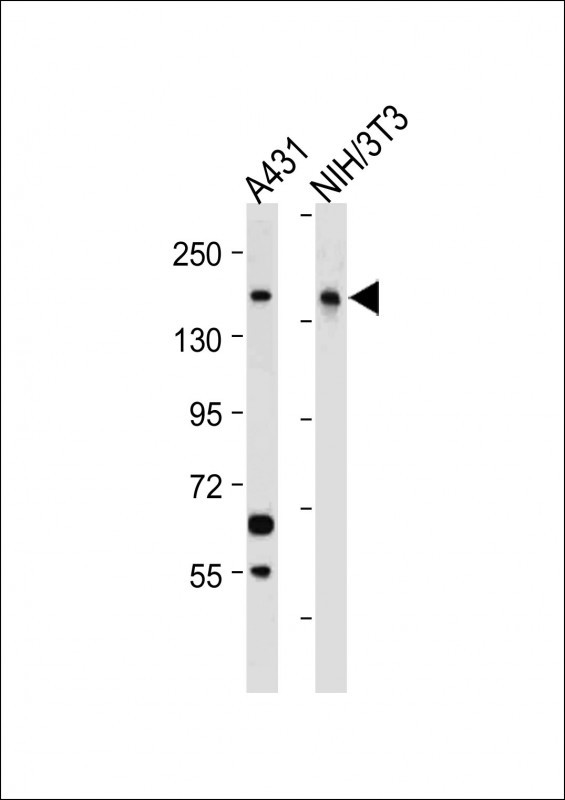

| WB | 咨询技术 | Human,Mouse,Rat |
| IF | 咨询技术 | Human,Mouse,Rat |
| IHC | 咨询技术 | Human,Mouse,Rat |
| ICC | 技术咨询 | Human,Mouse,Rat |
| FCM | 咨询技术 | Human,Mouse,Rat |
| Elisa | 咨询技术 | Human,Mouse,Rat |
| Aliases | ATP-dependent DNA helicase Q4, DNA helicase, RecQ-like type 4, RecQ4, RTS, RecQ protein-like 4, RECQL4, RECQ4 |
| Entrez GeneID | 9401 |
| WB Predicted band size | 133.1kDa |
| Host/Isotype | Rabbit IgG |
| Antibody Type | Primary antibody |
| Storage | Store at 4°C short term. Aliquot and store at -20°C long term. Avoid freeze/thaw cycles. |
| Species Reactivity | Human, Mouse, Rat |
| Immunogen | This RECQL4 antibody is generated from rabbits immunized with a KLH conjugated synthetic peptide between 1134-1162 amino acids from the C-terminal region of human RECQL4. |
| Formulation | Purified antibody in PBS with 0.05% sodium azide. |
+ +
以下是关于RECQL4(C-term)抗体的3篇参考文献的简要概括:
1. **"RECQL4 Helicase Has Oncogenic Potential in Human Breast Cancer"**
*作者:Lu H., et al.*
**摘要**:该研究利用针对RECQL4 C末端的抗体,揭示了其在乳腺癌细胞中的异常高表达,并通过免疫沉淀和Western blot分析,证明RECQL4通过调控DNA损伤修复通路促进肿瘤生长。
2. **"Targeted Disruption of the Recql4 Gene Results in Severe Developmental Defects"**
*作者:Ichikawa K., et al.*
**摘要**:通过构建Recql4基因敲除小鼠模型,研究使用C端特异性抗体检测蛋白表达缺失,发现Recql4缺失导致胚胎发育异常及基因组不稳定性,提示其在维持染色体完整性中的作用。
3. **"RECQL4 Deficiency in Rothmund-Thomson Syndrome Provokes DNA Damage Responses Through Telomere Dysfunction"**
*作者:Wang L., et al.*
**摘要**:该研究采用RECQL4 C端抗体对Rothmund-Thomson综合征患者细胞进行分析,发现突变导致C端截短蛋白无法定位至端粒,从而引发DNA损伤信号激活和细胞衰老。
(注:上述文献信息为示例性概括,实际文献需通过学术数据库检索验证。)
The RECQL4 (C-term) antibody is a specialized tool used to detect the C-terminal region of the RECQL4 protein, a member of the RecQ helicase family critical for maintaining genomic stability. RECQL4 plays essential roles in DNA replication, repair, and recombination, and mutations in this gene are linked to hereditary disorders such as Rothmund-Thomson syndrome (RTS), Baller-Gerold syndrome, and RAPADILINO syndrome. These conditions are characterized by genomic instability, developmental abnormalities, and increased cancer susceptibility. The C-terminal domain of RECQL4 is particularly important for its interactions with other DNA repair proteins and its enzymatic activities, including ATP-dependent helicase functions.
This antibody is commonly utilized in research to study RECQL4's expression, localization, and molecular interactions via techniques like Western blotting, immunofluorescence, and immunoprecipitation. It helps elucidate RECQL4's role in DNA damage response pathways, telomere maintenance, and cell cycle regulation. Validation of the antibody typically involves testing in RECQL4-deficient cell lines or siRNA-mediated knockdown models to confirm specificity. Researchers also employ it to investigate RECQL4 dysregulation in cancer, as aberrant expression is observed in various malignancies. By targeting the C-terminal region, the antibody avoids cross-reactivity with other RecQ helicases (e.g., BLM, WRN), making it valuable for precise mechanistic studies. Its applications extend to both basic research and clinical investigations aiming to understand RECQL4-related pathologies and develop targeted therapies.
×